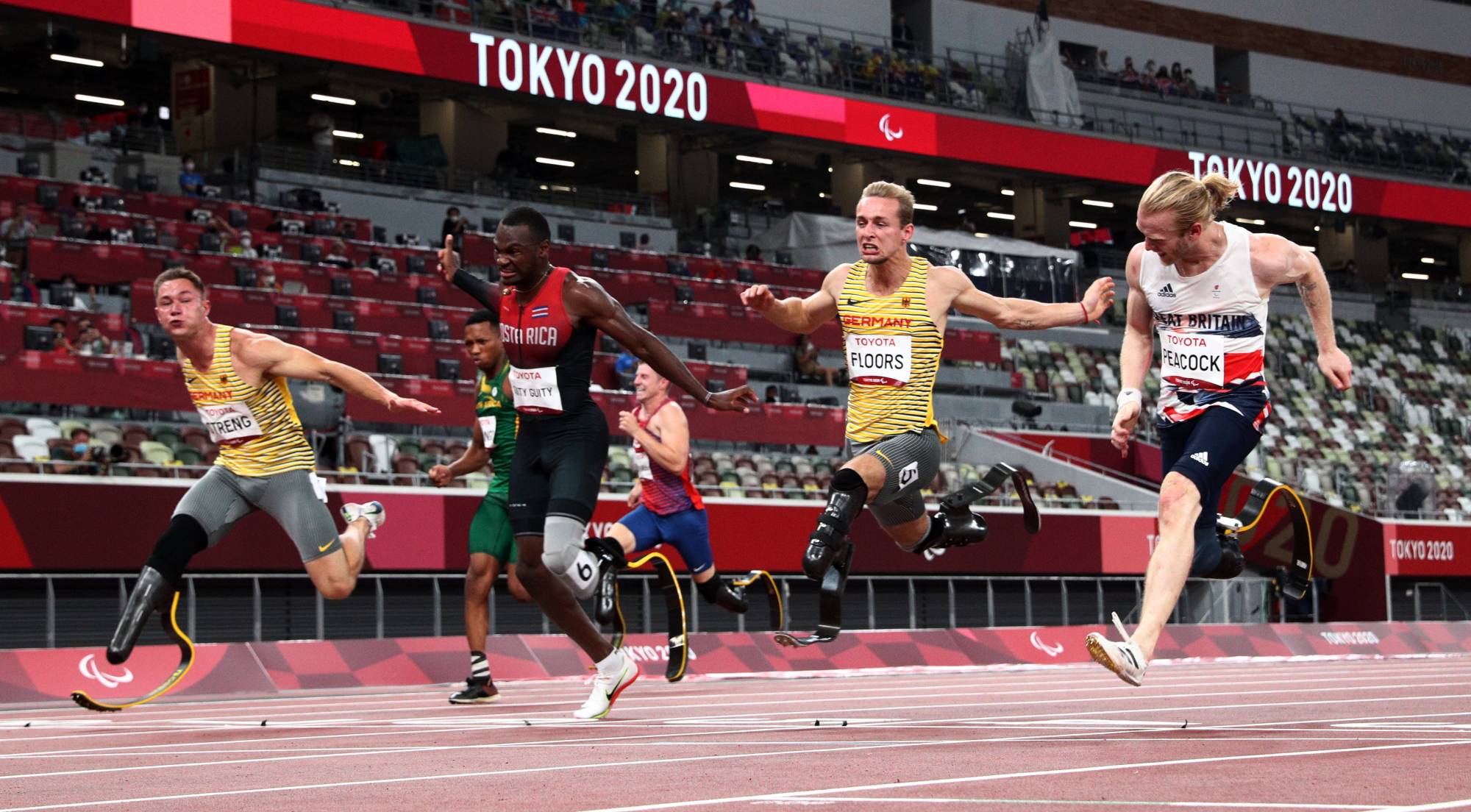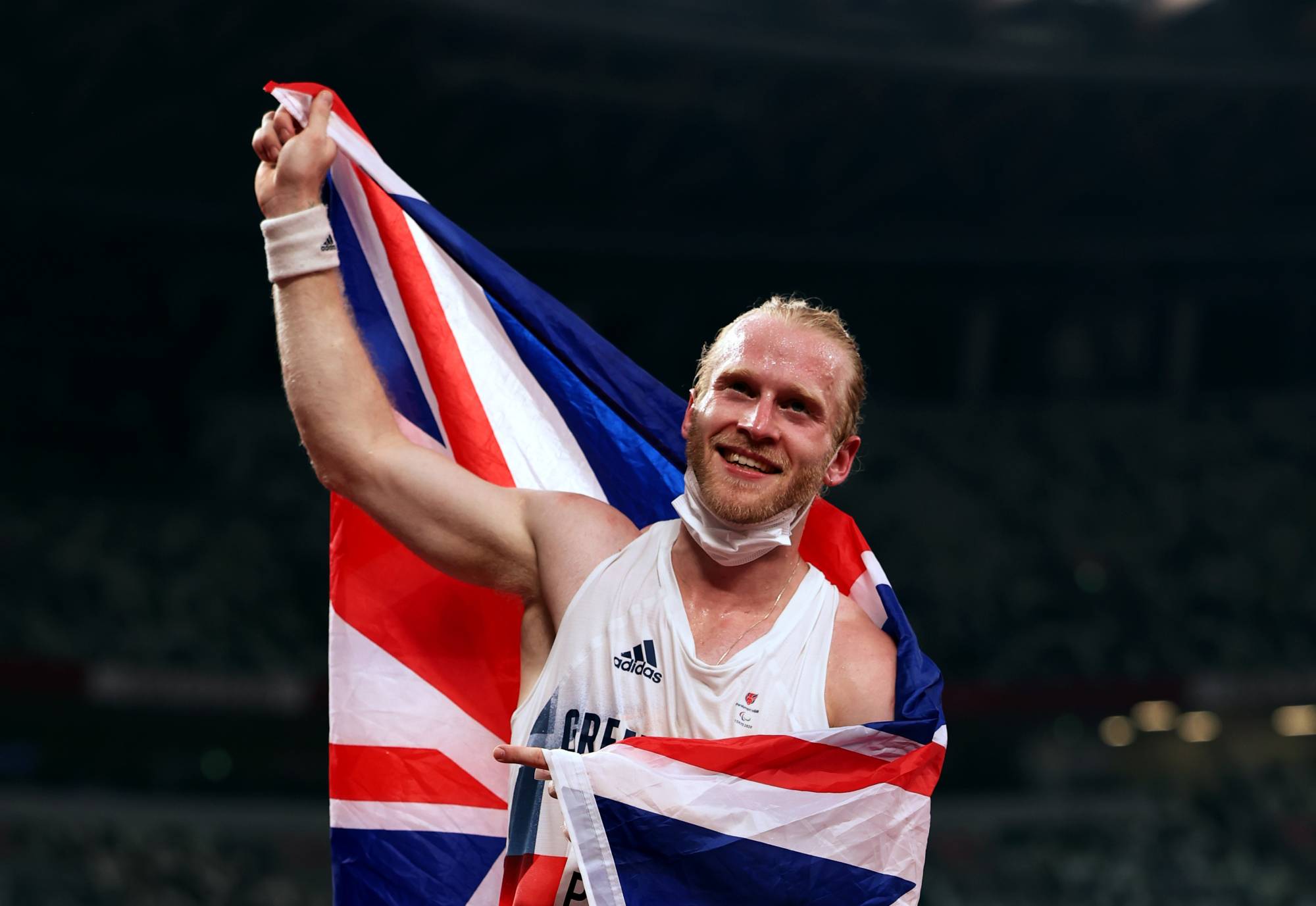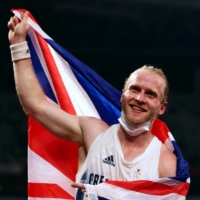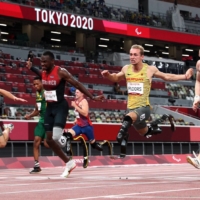The men's T64 100 meters at the Tokyo Paralympics had everything you could ask for from a race.
The blade runners — called that due to their bladed prostheses — all ran fast times and the race ended in thrilling fashion. The gold and silver medals were decided by just 0.02 seconds. As for the bronze, that required a suspenseful three-plus minute wait — as officials sorted out a photo finish — and finally a decision no one saw coming.
"If that's not an advert for Paralympic sport in 11 seconds, I don't know what is," Great Britain's Jonnie Peacock said. "It's a shame that that stadium wasn't full today, because I think the noise would've been incredible, I think the anticipation on the wait would have been incredible too. That would've been really fun, to enjoy that with them (the fans).”
The Paralympics often struggle for attention in the wake of the all-encompassing nature of the Olympic Games. Races such as Monday's T64 100, Peacock feels, can help shine a brighter light on the Games, which themselves seek to draw more attention to people with disabilities.
There has been more attention on Paralympians this year thanks to the Netflix documentary "Rising Phoenix" and the Wethe15 initiative, which the International Paralympic Committee is promoting as a way to encourage more understanding about people with disabilities. The name of the Wethe15 program is derived from the percentage of people around the world with disabilities, according to the IPC.
"We need to be represented and we're starting to get more representation now, which is fantastic to see,” said Peacock, who was among the athletes featured in “Rising Phoenix.” “I'm so proud to be a part of it."
Monday's race was one of the best of 2020 Tokyo Games — Olympic or Paralympic. German Felix Streng beat a tightly packed quartet to the finish line to win in 10.76 seconds. Costa Rica's Sherman Isidro Guity Guity took silver in 10.78.
"We want to show that we are competitive, that track and field parasport is amazing," Streng said.
Peacock and German Johannes Floors had a photo finish for bronze and endured a tense wait as officials tried to determine who crossed the line first. It was so close the pair ended up sharing the medal — a rarity in sprinting — with matching times of 10.79.

"It is always easier to share something if you like them, so it is really easy to share it with Jonnie," Floors said. "We have just shown we are on the same level. He is the Paralympic champion from last time and I'm the underdog, so maybe I'm happier than he is."
Peacock seemed pleased with himself afterward.
"To share the bronze medal with Johannes, I'm so happy," he said. "He's a great guy."
Peacock was looking for his third straight Paralympic gold, having topped the podium in London and Rio. He said he felt he had a chance to win, but that mistakes cost him a shot at gold. That, he said, is another indication of the improvement of para-athletics.
"That's what sport should be about," Peacock said. "You make a mistake in a Paralympic final, you should be made to pay for it. I was made to pay, because there were better athletes (out) there executing better races."
Although he was disappointed, the British star put on a happy face, saying "15-year-old Jonnie would have been over the moon with this result." He also felt overjoyed about what the competition said about parasports.
"Part of me is proud of that for the Paralympic sport and my race," Peacock said. "Because I think that is for me, and I'm biased, but I think that's one of the best races in the Paralympics. That's what the advert was.
"For me, I'm proud to be a part of that. Four people on the podium, I don't think I've seen that before."
That top four runners all finished under 11 seconds and Peacock says it is coaching, not blade technology, that is behind it. He feels that as more Paralympians enter elite coaching setups, the competition will continue to evolve.
"If you push sportsmen and sportswomen, they take that and run with it," he said.
Peacock has been fairly visible in recent years. In 2017, he was a contestant on the televised British dancing competition, “Strictly Come Dancing.” This year, he appeared in “Rising Phoenix” and in August had a cameo on British soap opera “Hollyoaks.” He also has a television series called “Jonnie's Blade Camp,” where he holds a training camp for five young amputees.
He joked about his short-lived run on “Strictly Come Dancing,” where he was eliminated early, but said things like that help push the Paralympic movement forward.
"I was so happy to be a part of that," he said. "I showed that I definitely wasn't the best dancer, so I was deserving to be kicked off. But, it's representation. Since that moment, we're seeing so many disabled people involved in shows.
"We're getting more and more people represented. This is the thing, when I was a kid, I (could not) tell you a disabled person. Long John Silver (was) pretty much the only disabled person I saw growing up.
"Now these kids are able to grow up and know that they're represented. I hope that we just keep expanding that. We need to see more representation across more things."





